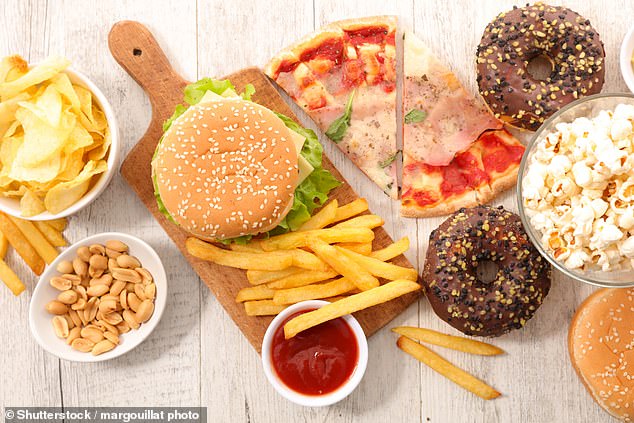- Lewisham has received £10,000 to draw up plans for the junk food advert ban
- The London borough has one of the worst childhood obesity rates in the country
- It would cover all billboards, bus stops and phone boxes across 13.5 square miles
Adverts for chocolate bars, ice creams and chips will be banned from billboards and bus stops across an entire borough.
The council’s initiative – the first of its kind – will also see advertising space used to encourage residents to walk more and eat less sugar.
The Department of Health has given Lewisham in south-east London £10,000 to draw up plans for the ban.
With 40 per cent of its 11-year-olds overweight, the borough has one of the worst childhood obesity rates in the country.

Adverts for chocolate bars, ice creams and chips will be banned from billboards and bus stops across a London borough (stock image)
The ban, which is aimed at any food or drink high in sugar, salt or fat, would cover all billboards, bus stops and phone boxes across the council’s 13.5 square miles of territory.
Products covered include chocolate bars, ice creams, chips, mayonnaise, puddings, honey and cola.
Lewisham’s feasibility study is expected to be completed within the next three months and the ban could be in place by April.
If it is deemed a success, other councils will be encouraged by health officials to follow suit.
In November, London mayor Sadiq Khan announced that junk food adverts would be banned across the capital’s transport network.
Edinburgh is also considering a council-wide advert ban and is investigating how it could work and how much it would cost. Chris Best, deputy mayor of Lewisham and cabinet member for health and adult social care, said: ‘We are one of 13 councils that are part of this initial stage out of 102 that applied, so we are thrilled to be able to take our ideas forward.
'In Lewisham, we are making progress to reduce childhood obesity across the borough. However, nearly one in five children are already overweight or obese on entering reception, rising to more than one in three in Year 6.
‘Tackling obesity is part of our agenda to reduce health inequalities – it is unacceptable that, nationally, children from the most deprived areas are more than twice as likely to be obese than children in the least deprived areas.
‘Research demonstrates that the development of children’s food preferences and behaviours are influenced by advertising and through working in this space we have a real opportunity to positively shape their behaviours and impact child obesity rates. Regulators and brands recognise that they have a role to play.’
A report released yesterday said big corporations were driving the obesity crisis by promoting junk food in the way tobacco firms push cigarettes (stock image)
Public health minister Steve Brine said: ‘We know that when it comes to improving the health of local communities, local leaders are the real experts.
‘We need innovation, ambition and passion to tackle childhood obesity, particularly in deprived areas, where children are more than twice as likely to be an unhealthy weight.’
The measures could hit councils through lost advertising revenue. Their budgets have shrunk by a quarter since 2010 due to reduced government funding and many have had to slash adult social care, children’s services and road repair.
A report released yesterday said big corporations were driving the obesity crisis by promoting junk food in the way tobacco firms push cigarettes.
Compiled by 43 academics from 14 countries, the Lancet Commission on Obesity accused politicians of inertia and said there was a ‘fundamental and irreconcilable conflict’ between much of the food industry and the health of the nation.








